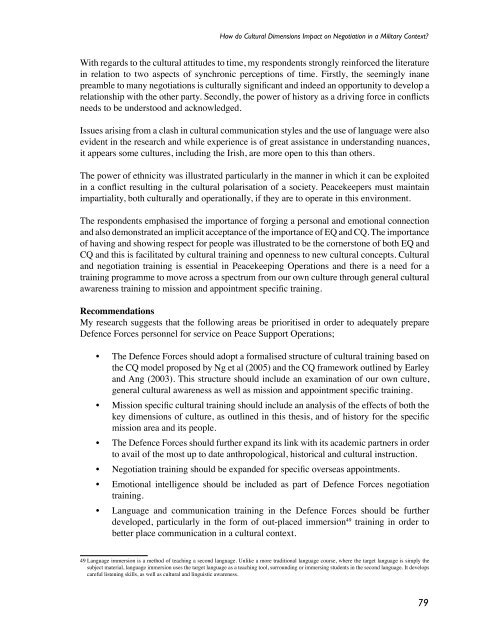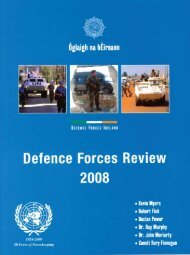Defence Forces Review 2010
Defence Forces Review 2010
Defence Forces Review 2010
Create successful ePaper yourself
Turn your PDF publications into a flip-book with our unique Google optimized e-Paper software.
How do Cultural Dimensions Impact on Negotiation in a Military Context?With regards to the cultural attitudes to time, my respondents strongly reinforced the literaturein relation to two aspects of synchronic perceptions of time. Firstly, the seemingly inanepreamble to many negotiations is culturally significant and indeed an opportunity to develop arelationship with the other party. Secondly, the power of history as a driving force in conflictsneeds to be understood and acknowledged.Issues arising from a clash in cultural communication styles and the use of language were alsoevident in the research and while experience is of great assistance in understanding nuances,it appears some cultures, including the Irish, are more open to this than others.The power of ethnicity was illustrated particularly in the manner in which it can be exploitedin a conflict resulting in the cultural polarisation of a society. Peacekeepers must maintainimpartiality, both culturally and operationally, if they are to operate in this environment.The respondents emphasised the importance of forging a personal and emotional connectionand also demonstrated an implicit acceptance of the importance of EQ and CQ. The importanceof having and showing respect for people was illustrated to be the cornerstone of both EQ andCQ and this is facilitated by cultural training and openness to new cultural concepts. Culturaland negotiation training is essential in Peacekeeping Operations and there is a need for atraining programme to move across a spectrum from our own culture through general culturalawareness training to mission and appointment specific training.RecommendationsMy research suggests that the following areas be prioritised in order to adequately prepare<strong>Defence</strong> <strong>Forces</strong> personnel for service on Peace Support Operations;• The <strong>Defence</strong> <strong>Forces</strong> should adopt a formalised structure of cultural training based onthe CQ model proposed by Ng et al (2005) and the CQ framework outlined by Earleyand Ang (2003). This structure should include an examination of our own culture,general cultural awareness as well as mission and appointment specific training.• Mission specific cultural training should include an analysis of the effects of both thekey dimensions of culture, as outlined in this thesis, and of history for the specificmission area and its people.• The <strong>Defence</strong> <strong>Forces</strong> should further expand its link with its academic partners in orderto avail of the most up to date anthropological, historical and cultural instruction.• Negotiation training should be expanded for specific overseas appointments.• Emotional intelligence should be included as part of <strong>Defence</strong> <strong>Forces</strong> negotiationtraining.• Language and communication training in the <strong>Defence</strong> <strong>Forces</strong> should be furtherdeveloped, particularly in the form of out-placed immersion 49 training in order tobetter place communication in a cultural context.49 Language immersion is a method of teaching a second language. Unlike a more traditional language course, where the target language is simply thesubject material, language immersion uses the target language as a teaching tool, surrounding or immersing students in the second language. It developscareful listening skills, as well as cultural and linguistic awareness.79
















